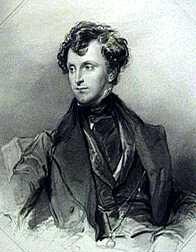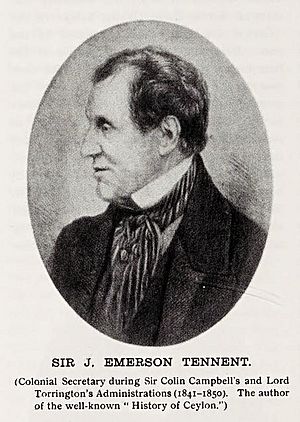James Emerson Tennent facts for kids
Quick facts for kids
Sir James Emerson Tennent
|
|
|---|---|

James Tennent drawing by Andrew Nicholl
|
|
| 5th Colonial Secretary of Ceylon | |
| In office 1846–1850 |
|
| Monarch | Queen Victoria |
| Preceded by | Philip Anstruther |
| Succeeded by | Charles Justin MacCarthy |
| Acting Governor of British Ceylon | |
| In office 19 April 1847 – 29 May 1847 |
|
| Monarch | Queen Victoria |
| Preceded by | Colin Campbell |
| Succeeded by | The Viscount Torrington |
| Personal details | |
| Born |
James Emerson
7 April 1804 Belfast, United Kingdom of Great Britain and Ireland |
| Died | 6 March 1869 (aged 64) London |
| Citizenship | United Kingdom |
| Political party | Whigs (until 1834) Conservatives (1834–1869) |
| Spouse | Letitia Tennent |
| Children | 3 |
| Alma mater | Trinity College, Dublin |
| Occupation | Colonial administrator, politician |
| Profession | Lawyer |
Sir James Emerson Tennent (born James Emerson; 7 April 1804 – 6 March 1869) was an important British politician and administrator. He served in the Parliament of the United Kingdom for areas in Ireland. Later, he became the Chief Secretary of Ceylon (now Sri Lanka). He was also a Fellow of the Royal Society, which is a group for top scientists.
Contents
Early Life and Education
James Emerson was born in Belfast on April 7, 1804. He was the only son of William Emerson, a rich tobacco merchant. James went to the Belfast Royal Academy and then to Trinity College, Dublin.
Helping Greece Gain Freedom
In 1824, James Emerson traveled to Greece. He wanted to help Greece gain independence from the Ottoman Empire. He joined the artillery (cannon) corps led by the famous poet Lord Byron. Emerson stayed with Lord Byron until the poet's death in April 1824.
After some time in England, he returned to Greece in 1825. He became a captain of artillery. Some records say he fought in the battle to end the Siege of the Acropolis in Athens.
Emerson wrote several books about Greece. His first book, Picture of Greece, came out in 1826. It helped people in Great Britain support Greece's fight for freedom. He also wrote Letters from the Aegean (1829) and a History of Modern Greece (1830).
Becoming a Lawyer and Getting Married
In 1831, James Emerson became a lawyer. That same year, he married Letitia Tennent. She was the co-heiress to a large family fortune. After her father died in 1832, James added "Tennent" to his name. This is how he became James Emerson Tennent.
Entering Politics
In 1832, James Emerson Tennent ran for Parliament in Belfast. He won and became a Member of Parliament (MP). He first supported the Whig party. Later, he joined the Conservatives.
He spoke in Parliament about important issues. For example, he supported ending slavery in the British Empire. He believed that being part of Great Britain brought more freedom to people. He said that British laws helped people from India to Africa.
Colonial Secretary in Ceylon
In 1845, James Emerson Tennent was knighted. This means he received the title "Sir." He was then appointed Colonial Secretary of Ceylon (now Sri Lanka). He stayed there until 1850.
During his time in Ceylon, there was an economic downturn. This affected coffee and cinnamon farmers. To help, he changed the tax system. He moved taxes from exports to items like guns, dogs, carts, and shops. He also added a tax instead of forced labor on plantation roads.
These changes made life harder for local farmers. It pushed them to work for low wages on plantations. Many local people resisted this. This led to the Matale Rebellion in 1848.
Emerson Tennent wrote books about his time in Ceylon. These included Christianity in Ceylon (1850) and Ceylon, Physical, Historical and Topographical (1859). His books were very detailed. The Oxford English Dictionary says he was the first to use the term "rogue elephant" in English. This came from a local Sinhala term. He also became the second President of the Ceylon Branch of the Royal Asiatic Society.
Later Life and Legacy
After returning to the United Kingdom, Sir James Emerson Tennent became an MP for Lisburn. He held several important government jobs. From 1852 to 1867, he was the permanent secretary to the Board of Trade. When he retired, he was made a baronet. This is a special title that can be passed down in a family. In 1862, he was elected a Fellow of the Royal Society.
Sir James Emerson Tennent died in London on March 6, 1869. He had two daughters and one son. His son, Sir William Emerson Tennent, also worked for the Board of Trade. When his son died, the baronetcy title ended.
Besides his books on Greece and Ceylon, he wrote about other topics. These included Belgium in 1840 and Wine: its Duties and Taxation. He was a friend of the famous writer Charles Dickens. Dickens even dedicated his last completed novel, Our Mutual Friend, to Emerson Tennent.
A species of Sri Lankan lizard, Ceratophora tennentii, is named after him.
Images for kids
 | Stephanie Wilson |
 | Charles Bolden |
 | Ronald McNair |
 | Frederick D. Gregory |




